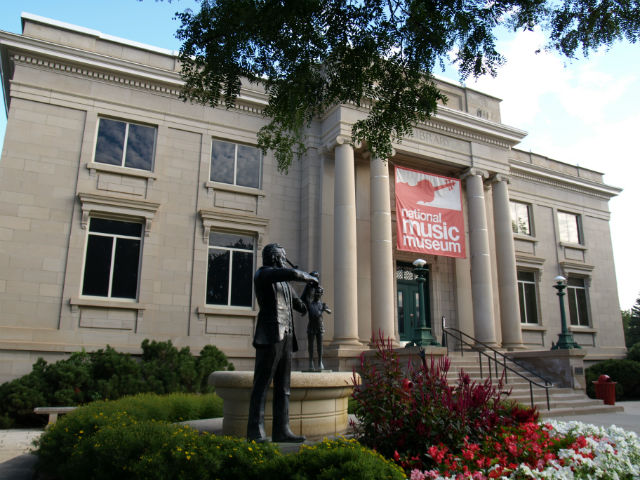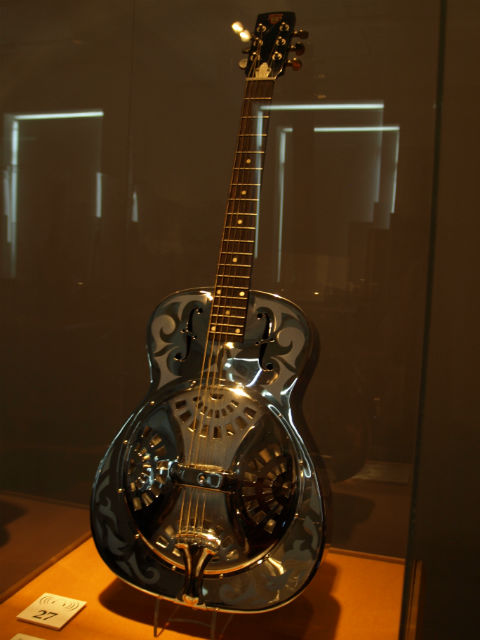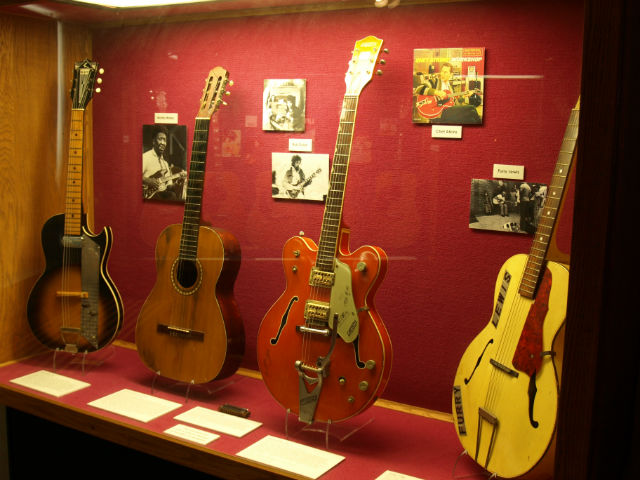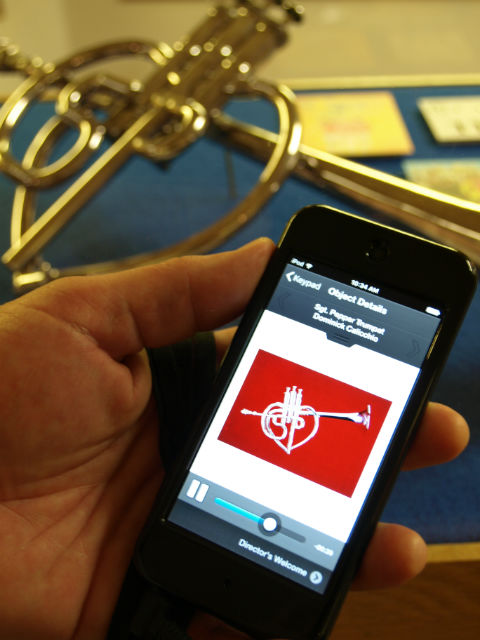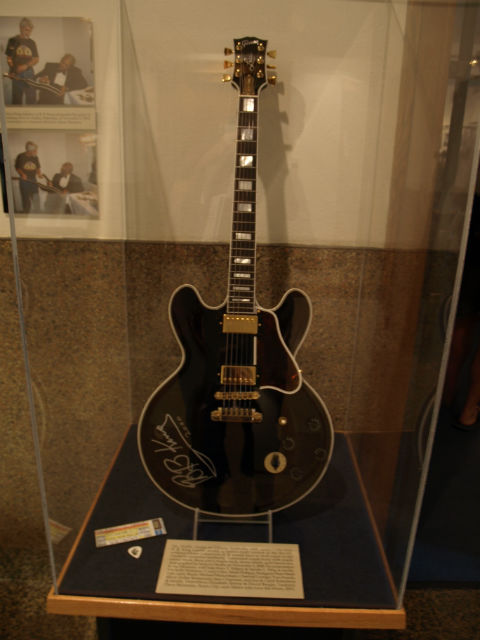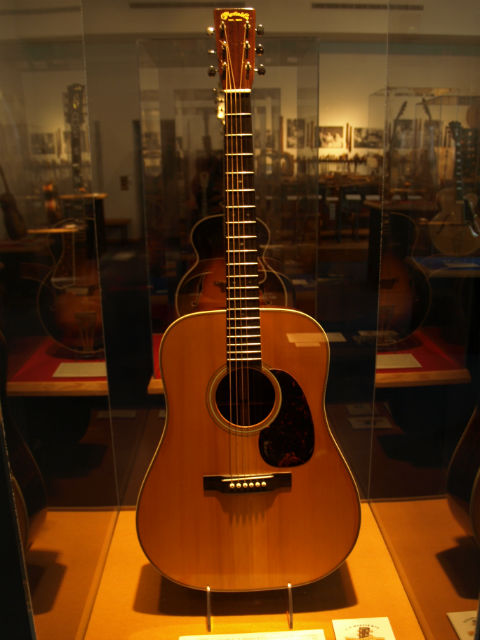Just when we were beginning to think Iowa was nothing but corn fields, we crossed into South Dakota (more corn but also enormous fields of bright yellow sunflowers) and stopped in the college town of Vermillion.
Had never even heard of Vermillion. Another surprise – who would have thought that it’s home to a world-class collection of instruments at the National Music Museum (NMM)? The billboard coming into town was a clue: “Les Paul, More Stradivarius.”
WARNING: Guitar porn below!
Set aside the sheer beauty of this massive collection: 13,000 instruments are in the archive; just 1/3 are rotated out on display at any one time.
There are many one-off instruments – experiments tried and abandoned because too expensive to produce or too specialized for the market of its day. Over the years, the NMM has acquired numerous instruments from various musical icons – Bob Dylan, Elvis Presley, Johnny Cash – and it’s just very cool to gaze upon the guitar on which Dylan wrote “A Hard Rain’s A-Gonna Fall” or on which Johnny Cash performed at Folsom Prison.
What’s clear is the dual influences of art and commerce on the progress of western culture.
We were knocked out by the tendency of instrument makers to consistently push the limits of their craft to perfect, innovate, improve and modify their designs. There was more than just art happening – there was the necessary money-making part of the equation. The instrument makers needed to satisfy their existing customers and grow their customer base.
Each designer pushing his own talents into new territory and challenging his peers to do the same. This seems like the grand energy that propels this art and commerce linkage: it’s not enough to make one lovely, ringing tenor banjo if you’re Orville Gibson. The world is going to beat a path to your door – if it’s any good – and you’re going to have to incorporate the design and artistic suggestions of your clients if you want to sell to them.
For one thing, you have to recoup your costs of production. But what good is it if all you do is recoup your costs? How are you going to make the next one if you don’t turn a modest profit?
The result is a virtuous circle that is on full display from exhibit to exhibit, through handcrafted Violas da Gamba from the 16th century to the Golden Age (before World War II) of Martin acoustic guitars.
Memories of Craig’s high school band days came roaring back (Jo … not so much!). The brass band section, particularly some of the designs by the C.G. Conn company of Elkhart, Indiana. Who didn’t play on a Conn instrument? These were simply fascinating as they tried to create instruments that produced more than one timbre for orchestras and players looking to enlarge the palette of sonic possibilities at their fingertips.
A terrific feature of the NMM is the iPod and headphone audio tour. You can listen to the instrument inside a glass case along with a short commentary on its features, design and manufacture.
We needed a couple of hours (and could have stayed longer). Get the iPod and headphones. They are included with admission and more than worth it. Wander through the exhibit rooms full of instruments you erroneously think you have no interest in.
Highlights:
- BB King’s Black Gibson ES-355 (Lucille)
- 5 Stradivari instruments
- Gibson Guitar Style 03 (1902) made by Orville Gibson
- Mint condition D-28 Martin (1941)
- One of Stevie Wonder’s Hohner Blues harps
- Trumpet used as a prop in the film Sgt. Pepper’s Lonely Hearts Club Band
- Martin D-35 used by Elvis Presley (1976-77)
- The Fred, Gretsch – Chet Atkins electric guitar
- Martin D-28 used by Johnny Cash for the last 30 years of his life
- Kay guitar played by Muddy Waters
- Very rare Jacob Stainer violin in mint condition (1668)
- Theremin – the world’s first electronic musical instrument
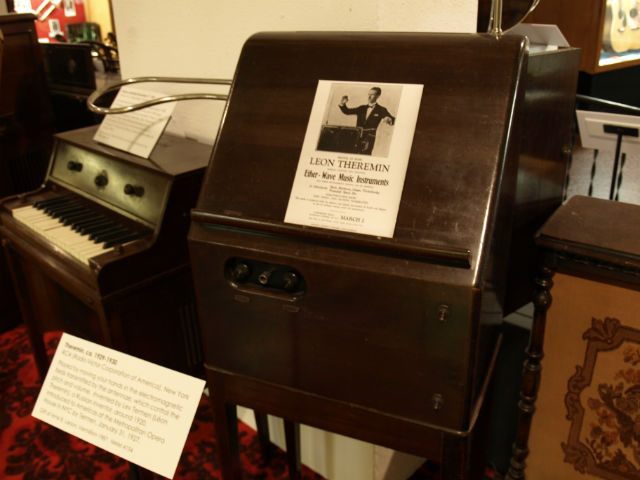
National Music Museum, on the University of South Dakota campus. www.nmmusd.org/

